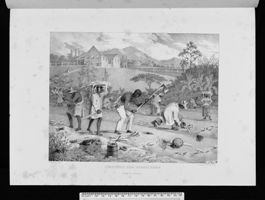 Did abolition of the transatlantic
slave trade damage enslaved women's health?
Did abolition of the transatlantic
slave trade damage enslaved women's health?
In 1807, the British parliament voted to abolish the transatlantic slave trade, following a long campaign led by William Wilberforce.
While most plantation owners opposed abolition, a few did not - including Joseph Foster Barham II, who owned Mesopotamia sugar estate in Jamaica.
Appalled by the suffering caused by the slave trade, Foster Barham (as MP for Stockbridge) voted with Wilberforce in the House of Commons for abolition and voluntarily ceased to purchase new African arrivals in 1792, 15 years before legal abolition. Mesopotamia's records are unusually detailed and record the ages, date of arrival, origin (whether African or born on the estate), health status, and work duties of 1,099 enslaved individuals on the estate between 1762 and 1832. These manuscripts are preserved in the Bodleian Library, Oxford.
On Mesopotamia, withdrawal from the slave trade led to an increase in the number of women sent to work in the cane fields, work considered to be the most arduous and riskiest on a plantation. Survival analysis suggests there was an accompanying deterioration in their survival chances: estimates suggest the risk of death was about 55% to 75%higher for women arriving on the estate after 1792 than before. To test whether exposure to fieldwork accounts for reduced survival prospects, the actual survival times of slaves (i.e. time to death) was compared with their counterfactual survival times had they never been exposed to fieldwork. The technique employed is intended to avoid problems caused by the ‘healthy worker survival effect': the tendency for labourers to be withdrawn from a hazardous occupation as their health failed, and reallocated to lighter duties.
Estimates suggest that continuous exposure to fieldwork on a sugar estate, relative to never being exposed, reduced survival times by approximately 30%. Consequently, the dread slaves felt at being sent to the fields appears well placed, especially for women who were less likely to occupy supervisory roles in sugar cultivation and, therefore, enjoyed the least amount of protection.
Abolition of the transatlantic slave trade relieved the suffering of African captives: on average, 12-13% of slaves failed to survive the Atlantic crossing. Research on Mesopotamia, however, suggests that the costs of adjusting to this momentous reform were borne by enslaved field workers and that this burden fell disproportionately on women.
Read the full version of this article, published in Significance Magazine. A full account of the research may be found in volume 4, 2011 of the Journal of the Royal Statistical Society, Series A.
Simon
Smith (Senior Tutor, Brasenose)
Martin
Forster (Lecturer in Economics, University of York)
